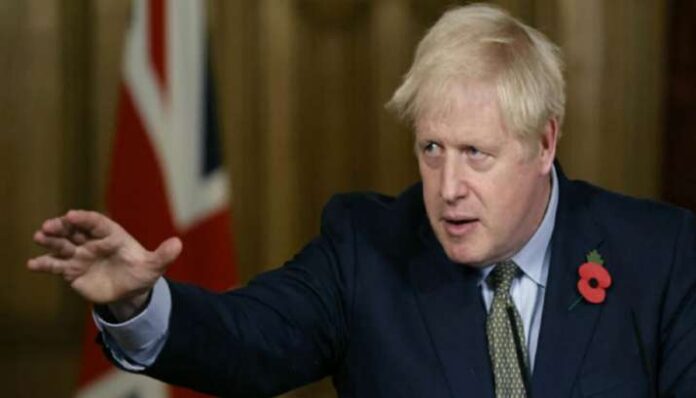| Translate This News In |
|---|
Prime Minister Boris Johnson warned on Sunday that the omicron coronavirus strain is causing a “tidal wave” of infections in the United Kingdom, and ordered a massive increase in booster vaccines to improve defences against it. In a televised announcement, Johnson announced that as a result of the omicron “emergency,” everyone 18 and older will be administered a third shot of vaccination by the end of the month. The prior deadline was set for the end of January.
In Britain, occurrences of the highly transmissible variety are doubling every two to three days, and “a tidal wave of omicron is approaching,” he said.
“I am afraid it is now evident that two vaccination doses are simply insufficient to provide the kind of protection that we all require,” Johnson said. “However, our scientists are convinced that with a third treatment — a booster dose – we can all restore our level of protection.”
He announced a “national mission” to administer booster immunizations, with pop-up vaccination facilities operating seven days a week, with military planners and hundreds of volunteer vaccinators providing extra support.
The deadline set by Johnson is December 31. Scotland, Wales, and Northern Ireland, as well as the rest of the United Kingdom, are anticipated to accelerate their vaccination campaigns.
Existing immunizations tend to be less successful in preventing symptomatic infections in those exposed to omicron, according to the United Kingdom’s Health Security Agency, while preliminary evidence suggests that with a third vaccine dosage, efficiency rises to between 70% and 75%.
In the United Kingdom, more over 80% of persons aged 12 and up have got two vaccine doses, with 40% of adults receiving three. In the following three weeks, giving the rest a boost will be a major challenge, requiring over 1 million doses per day. Many normal medical operations would have to be postponed in order to reach the deadline, according to Johnson.
Johnson’s declaration came only hours after the British government upped the country’s official coronavirus hazard level, warning that the omicron variant’s rapid expansion has pushed the country into dangerous area.
At a time when COVID-19 is already widespread, the chief medical officers of England, Scotland, Wales, and Northern Ireland have stated that the new highly transmissible strain “adds extra and fast increasing risk to the public and health care providers.” On a scale of one to five, they suggested increasing the alert level from 3 to 4. The highest number, 5, denotes that authorities believe the health-care system is on the verge of collapsing.
Early evidence reveals that omicron is spreading far quicker than the currently dominant delta form, and that vaccines offer less protection against it, according to the physicians. Omicron is expected to overtake delta as the dominant strain in the United Kingdom in the next days, according to British officials.
“Data on severity will become clearer in the following weeks,” they stated, “but omicron-related hospitalizations are already occurring and are likely to increase fast.”
Concerns about the new type prompted Johnson’s Conservative government to reinstate restrictions that had been eased little over a year ago. COVID-certified masks must be worn in most indoor settings. Nightclubs require 19 certificates, and people are encouraged to work from home if at all possible.
Many scientists, however, believe it will not be enough, and are asking for stricter steps, which the government has so far refrained from taking. Scientists in South Africa, where omicron was initially discovered, say they see hints that it may cause less severe disease than delta, but believe it is too early to tell.


















